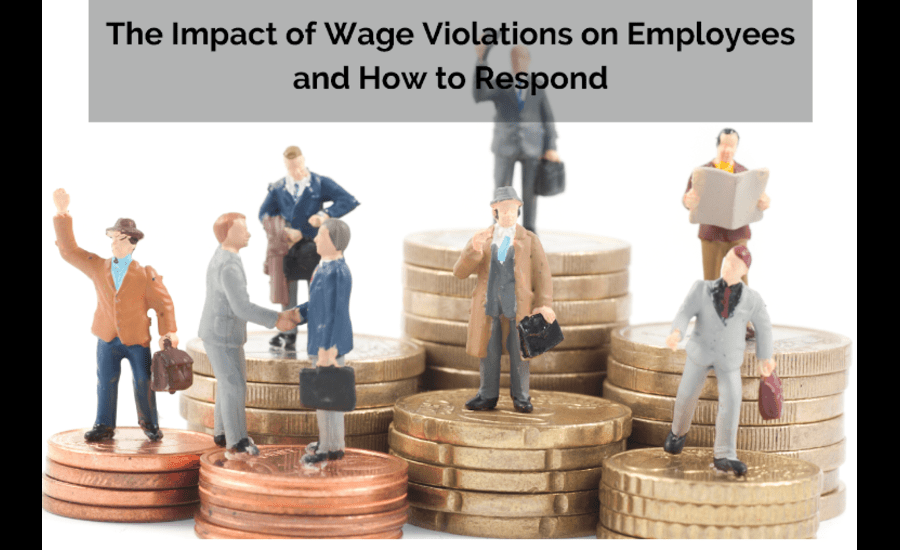The Impact of Wage Violations on Employees and How to Respond
Have you ever wondered how wage violations impact employees and what steps can be taken to address them?
Wage theft and unfair compensation are critical issues that affect countless workers every year. From missing paychecks to illegal deductions, these violations can undermine financial stability and well-being.
Understanding the scope of these issues and knowing how to respond effectively is essential for both protecting workers’ rights and fostering a fair work environment. This article explores the various ways wage violations impact employees and guides how to take action against these injustices.
The Pervasive Issue of Wage Violations
Wage theft, a term encompassing various forms of wage violations, is more widespread than many realize. It occurs in numerous industries and affects workers of all backgrounds, though some groups are disproportionately impacted.
The forms of wage violations are diverse and often insidious:
- Paying less than minimum wage: This occurs when workers receive less than the federally mandated minimum wage, or the state minimum wage if it’s higher.
- Failure to pay overtime: Many employees are entitled to 1.5 times their regular pay rate for hours worked beyond 40 in a week, but this is often neglected.
- Requiring off-the-clock work: Some workers are asked to perform tasks before clocking in or after clocking out, effectively working for free.
- Making illegal deductions from paychecks: Deductions that bring an employee’s pay below minimum wage are generally illegal.
Los Angeles, like many major cities, faces significant challenges with wage violations, especially in industries such as construction, food service, and retail. The city’s large and diverse workforce, including many low-wage and immigrant workers, makes it a hotspot for these unfair practices.
If you are working in Los Angeles and experiencing wage violations, it is crucial to understand your rights and take appropriate action. Consulting a workers compensation attorney Los Angeles can provide invaluable assistance. These legal professionals specialize in labor law and can help you navigate the complexities of filing a complaint and recovering lost wages.
Low-wage workers and those from marginalized communities often bear the brunt of these violations. Industries such as construction, food service, retail, and domestic work are particularly prone to such practices. The reasons for this are complex, ranging from lack of awareness of labor laws to intentional exploitation of vulnerable workers.
The Psychological and Economic Consequences for Employees
The impact of wage violations extends far beyond mere financial loss. Workers who experience wage theft often face significant psychological and economic hardships that can have long-lasting effects on their lives and well-being.
Psychological Toll
Wage violations have severe psychological impacts, including chronic stress and anxiety from financial insecurity. Workers often experience decreased job satisfaction and lower morale, feeling undervalued and exploited. This toxic work environment can lead to long-term mental health issues like depression.
Economic Hardships
Wage violations cause severe financial strain, making it hard for workers to meet basic needs like food, housing, and healthcare, leading to insecurity and instability. To cover lost wages, workers may incur high-interest debt, deepening financial hardship.
These violations disrupt long-term financial plans, hindering savings for emergencies, education, or retirement, and perpetuating economic instability. For those living paycheck to paycheck, wage theft can push them into poverty, worsening economic inequality.
The impact extends beyond individuals, as reduced consumer spending due to wage theft can harm local economies, leading to job losses and economic slowdowns in affected communities.
Legal Recourse and Employee Rights
Understanding your rights is the first crucial step in combating wage violations. The Fair Labor Standards Act (FLSA) provides important protections for workers across the United States. This federal law establishes minimum wage, overtime pay eligibility, recordkeeping, and child labor standards affecting full-time and part-time workers in the private sector and in federal, state, and local governments.
Key rights under the FLSA include:
- The right to receive at least the federal minimum wage (currently $7.25 per hour)
- Eligibility for overtime pay at a rate of not less than 1.5 times the regular rate of pay for hours worked beyond 40 in a workweek
- Protection against retaliation for reporting violations or filing a complaint
It’s important to note that many states have laws that provide additional protections, often with higher minimum wage requirements than the federal standard. Workers are entitled to a higher standard when state and federal laws differ.
Steps to Take if You Experience Wage Violations
If you believe you’re experiencing wage violations, taking prompt and strategic action is crucial. Here’s a detailed guide on the steps you should consider:
1. Document everything: Keep meticulous records of your hours worked, pay received, and any communications about your wages. This includes saving pay stubs, time cards, and even personal notes about your work hours.
2. Speak up: If you feel safe doing so, raise the issue with your HR department or supervisor. Sometimes, wage violations can result from honest mistakes, and bringing it to their attention may resolve the issue.
3. File a complaint: If the issue isn’t resolved internally, you can report violations to the Wage and Hour Division of the U.S. Department of Labor. They have the authority to investigate and enforce federal labor laws.
4. Seek legal counsel: Consider consulting with an employment lawyer who specializes in wage and hour laws. They can provide personalized advice based on your specific situation and help you understand your options.
5. Know the deadlines: Under the FLSA, you generally have two years from the date of the violation to file a complaint. This extends to three years for willful violations. Don’t delay in taking action, as waiting too long could mean losing your right to recover lost wages.
Collective Action and Advocacy
While individual action is important, collective efforts can be even more powerful in addressing wage violations. By joining forces, workers can amplify their voices and create meaningful change in labor practices and policies.
The Power of Collective Bargaining
Unions play a crucial role in protecting workers from wage violations. Through collective bargaining, unions can negotiate fair wage structures, ensure proper overtime compensation, and advocate for better enforcement of labor laws. The power of unions in protecting workers’ rights cannot be overstated.
Studies consistently show that unionized workers fare better in terms of wages and benefits. According to the Bureau of Labor Statistics, union workers earn on average 10-20% more than their non-union counterparts. This wage premium highlights the effectiveness of collective action in securing fair compensation.
Advocacy and Policy Changes
Beyond unions, advocacy groups are pushing for stronger wage protections at all levels. Key focus areas include:
- Higher minimum wages: Advocates push for a $15 federal minimum wage, arguing that the current $7.25 is inadequate.
- Eliminating subminimum wages for tipped workers: Many states allow as low as $2.13 per hour, leaving workers vulnerable to wage theft.
- Improving reporting and enforcement: Efforts include strengthening whistleblower protections and boosting enforcement agency funding.
- Fair scheduling laws: These laws aim to provide more predictable schedules and compensation for last-minute changes.
These efforts have led to significant progress, with many areas raising minimum wages and implementing fair workweek laws.
The Role of Whistleblowers and Community Support
Whistleblowers are essential in uncovering wage violations and safeguarding worker rights. By exposing illegal practices, these courageous individuals often jeopardize their own job security but pave the way for necessary investigations and industry-wide reforms.
If you’re considering blowing the whistle, follow these steps:
- Gather solid evidence: Collect pay stubs, time records, and documentation of any wage-related conversations.
- Understand your legal protections: Laws like the Whistleblower Protection Act safeguard you against retaliation.
- Consult an attorney: Legal advice can help you navigate the process and protect your rights.
- Report the violations: Contact the Department of Labor, state labor agencies, or law enforcement.
Community Resources
Workers don’t have to face wage violations alone. Legal aid societies offer free or affordable legal services, while worker centers support low-wage workers, especially in high-risk industries. Labor rights advocacy groups like the National Employment Law Project provide valuable resources and advocacy.
FAQs
Can I be fired for reporting wage violations?
It’s illegal to retaliate against an employee for reporting wage violations. If you experience retaliation, you can file a complaint with the Department of Labor or pursue legal action.
How long do I have to file a complaint about wage violations?
Under the FLSA, you generally have two years from the date of the violation to file a complaint. This period may extend to three years if the violation is willful.
What if I’m an undocumented worker experiencing wage violations?
Labor laws protect all workers, regardless of immigration status. You have the right to file wage claims without fear of immigration consequences.
Conclusion
Wage violations have far-reaching impacts on employees, affecting their financial stability, mental health, and overall quality of life. By understanding their rights, taking action when violations occur, and supporting collective efforts to improve labor standards, workers can fight back against these unfair practices.
Remember, you’re not alone in this fight. With the right knowledge and support, it’s possible to stand up for your rights and ensure fair compensation for your hard work.






